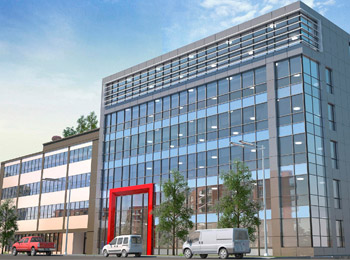MONTREAL — TAV College, a post-secondary institution founded more than 25 years ago to provide job training to chassidic Jews, is undergoing a major expansion to accommodate a soaring enrolment.
It’s a remarkable turnaround for an institution whose future appeared in doubt only a few years ago.
Groundbreaking was held April 16 for the construction of a six-storey building adjacent to the school’s premises at 6333 Décarie Blvd. in Côte des Neiges, with completion expected by next February.
The approximately $7.5-million project, which will add 42,000 square feet, more than doubles the college’s current space. TAV has been located in a four-storey former office building since 2001. The addition is being made where the parking lot is now located.
TAV currently has approximately 635 students, about half of whom are Jewish, and its educational director, Eli Meroz, said the number is expected to surpass 1,000 within a couple of years.
TAV is today a private CEGEP offering instruction in marketable skills, notably in early childhood education, office systems and accounting, and language intervention techniques, mostly certificate programs, but also some pre-university courses.
The new building will not only ease crowding, but also allow for additional programs. Most notably, TAV has made a request to the Quebec government to start offering health sciences.
“We are very excited about this long-awaited moment,” said TAV president and founder Abraham Boyarsky, a Concordia University mathematics professor and Lubavitch community member.
“With more classrooms and state-of-the-art lab space, we can offer even more programs and services to our growing and diverse student population.”
These will include chemistry, physics, biology and computer labs, a gym, a library, a cafeteria and offices for support services. Designed by Architectes Joly Baygin, the new facility will be constructed right beside the original, with interior access between the two.
The expansion is being paid for out of the school’s operating budget – the government is not contributing.
Boyarsky hopes some private funding can be found.
In appealing for Jewish support, Boyarsky said, an enhanced TAV will have an “enduring impact on the prosperity and continuity of Montreal’s Jewish community and offer real tools for self-reliance to a vulnerable and often overlooked population.”
Boyarsky founded TAV (which originally stood for Torah and Vocational Institute of Montreal) to provide much-needed career-oriented education to chassidic men and women. Originally, classes were gender-segregated and Jewish studies were an integral part of the curriculum.
TAV’s future appeared shaky four years ago when the Quebec government decided that, because of its religious character, the college would no longer receive public funding. TAV had obtained the provincial money through its affiliation for many years with the public Marie-Victorin CEGEP.
TAV was not permitted to accept any new students, and its enrolment plummeted to 200 three years ago.
TAV officials protested that, while it had maintained its historic mission to accommodate the needs of strictly observant Jewish students, it had evolved dramatically from its early years.
Classes were no longer segregated “by design,” and the student population today is highly multicultural. No religion is taught.
Some classes may be nearly all-female or Jewish, Meroz said, but that’s because of the subject, for example early childhood education, or the scheduling. There are no classes on or near Shabbat or holidays.
Since being forced to go it alone, TAV has, ironically, flourished. Some public funding has been restored, Meroz said, as long as TAV “respects the values of Quebec society,” as the education ministry has requested.
Meroz said it’s not unusual to see an Orthodox Jewish woman in a sheitel sitting together in the same classroom with a Muslim woman in a hijab.
“We welcome everyone,” he said. “There are students from more than 30 nationalities here, the great majority are immigrants and most are mature students. Many courses are offered in English and French.
“We make higher education accessible to adult learners by tailoring our approach to their particular needs, in scheduling, content and course load,” Meroz continued. “We are a model of integration and an example of how adult education can and must succeed.”
For example, free remedial courses are provided to students who have a high school diploma, but do not have the necessary science prerequisites.
Meroz expects enrolment to continue to grow, especially because the English public CEGEPs are turning away students from pure and applied science programs at an average annual rate of 100 applicants.
In addition to health sciences, TAV also hopes to add computer-assisted design, paralegal services, special education and computer networking programs.
“Though we serve everyone, it does not diminish the fact that we still respond to the needs of the Orthodox Jewish community. We offer an environment consistent with their values. TAV is run by people sensitive to them,” Meroz said.
“A lot would not go to a public CEGEP because they would have difficulty integrating. Some are now going to Israel [for post-secondary study] and often do not come back.”
Going to Israel is becoming less affordable because the Israeli government is cutting its education budget, he added.
TAV charges $600 per semester (this may go up to $800 for the new science program), but the majority of students receive subsidization, Meroz said.
